Scratch Crayon V2 Original Design / Scratch Built
Scratch - Crayon V2 {Scratch}
Contributed by Scott Turnbull
| Manufacturer: | Scratch |
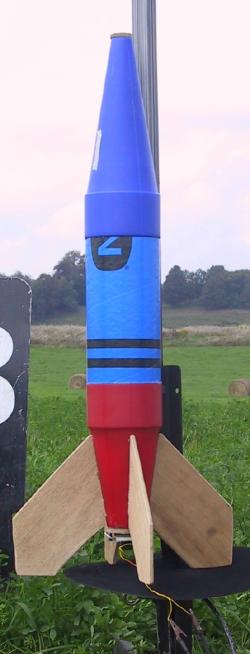
Brief:
This scratch built rocket is a V2 inspired design built up from pieces of 4
inch diameter crayon banks. It features a 29mm motor mount and through the wall
fins in the plastic boattail.
Construction:
The Bill of Materials for the C-V2 Consists of-
- Two crayon bank conical tips
- One 7 inch section of 4 inch crayon bank body tube
- 29mm Motor Mount
- 10 feet of bungie cord
- 7 inches of 1/8 steel cable with ferrules
- Luan Plywood
- Small Carriage Bolt and wingnut
- Two Eyebolts with nuts and washers
- Two threaded inserts for motor retention
The Crayon-V2 (C-V2) was inspired by the loss of another small V2, and a chance collection of leftover parts from construction of a full length crayon rocket. In piecing together various parts, I put together a two crayon tips separated by a short section of crayon tube.
Knowing that the crayon bank plastic is notoriously hard to bond to, I planned an interlocking set of components that mechanically trap the motor mount and fins within the plastic boat tail. The parts are epoxied to the plastic, but the interlocks provide the majority of the strength.
I started by using a set of drill mounted hole saws to make three centering rings. Each has a 29mm center, and a unique outer diameter. The tip of one crayon tip was sawed off such that the smallest ring would rest on the narrow opening of the remaining cone. The middle sized ring sits part way down within the tail cone. The largest ring sits inside at the top of the tail cone.
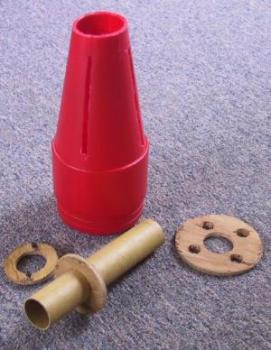
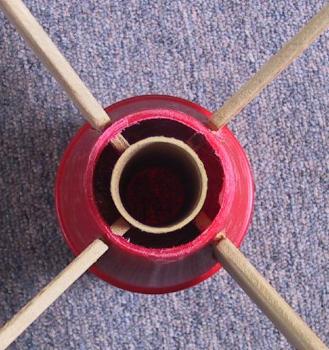
The middle ring was epoxied to the motor mount tube such that the motor mount extends about an inch below the tail cone tip. The tip ring was press fit on the MMT to lock it temporarily in place. The existing coin slot in the tail cone was extended lengthwise to make a fin slot. Similar slots were made at three more equally spaced positions on the tail cone. I used a Dremel cutting wheel for this. Once the wheel comes up to speed, it heats the plastic and the slot is melted as much as it is cut.
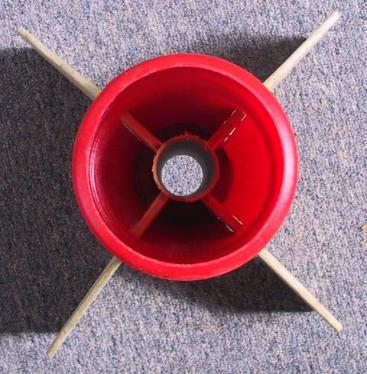
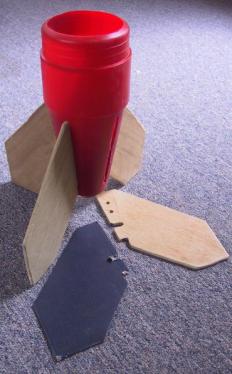
I used thin cardboard to make a fin template. It includes a tab that reaches into the tail cone and meets the MMT. A key feature is the notch in the fin tab that the middle centering ring fits into. I cloned the single template to make four temporary cardboard fins to test fit dimensions. When I was satisfied with the template I used it to cut out four plywood fins. Some fine tuning of the fins and fin slots was done with a Dremel to ensure a tight fit to the MMT and middle centering ring. I drilled two holes in each fin tab to help interlock the fins with the planned foaming of the tail cone. I also drilled holes in the upper centering ring for potential use in final foaming.
Once the fins were epoxied to the centering ring and motor mount, I used two part expanding foam to fill the area above and below the middle ring. I used enough foam so that it overfilled the areas. That allowed cutting and grinding the excess down to a level surface for attaching the remaining two rings.
An eyebolt with bolt and washer was installed in the upper ring prior to epoxying the ring to the cone, foam, and top of the fin tabs. This is for attaching the recovery harness.
Two externally threaded inserts with internal machine threads were mounted on either side of the MMT hole on the lower ring. The ring dimensions were such that a T-nut could not be used. Epoxy was used on the upper surface of the bottom ring to help retain the threaded inserts. JBWeld was used to attach the lower ring to the tail cone tip and MMT. JBWeld was slathered up over the lip of the threaded inserts. The bolts that thread into the inserts are used for motor retention.
That completes the boat tail construction.
The nose cone was fashioned from the other crayon bank tip. A wooden disk that was cut from the middle of a centering ring was used as a washer on the outside of the nose tip. A carriage bolt is pushed through the wooden washer, through the cone tip, and through a wooden bulkhead inside the nose cone. An eyebolt with nut and washer is mounted on the bulkhead for attaching the recovery harness. This arrangement of bolt, washer, and bulkhead allows the nose cone to be assembled without any epoxy. A wingnut on the lower tip of the carriage bolt locks the bulkhead up into the cone tip.
One rail button was attached at the lowest cylindrical portion of the boat tail shoulder. A nut was used to attach the button, rather than epoxy. A masking tape friction fit was used to attach the body tube to the boat tail. A second rail button bolt goes through the tube, the boat tail shoulder, and into a nut. Neither of these nuts and bolts interfere with harness or parachute within the airframe. One bolt is directly above the upper centering ring. The other is tucked under the upper lip of the boat tail shoulder.
I used a short length of 1/8 inch steel cable, and four cable ferrules, to fashion a length of heat resistant recovery harness with a loop at each end. This is connected to the upper motor mount eyebolt using a small quicklink. A ten foot length of bungy cord is connected to the steel cable and to the eyebolt in the nose cone. That completes the recovery harness assembly.
I used a nylon parachute attached to the loop tied in the bungy cord using a quicklink. A Nomex® blanket is threaded on the recovery harness to protect the parachute.
A quick run through using VCP confirmed the suspicion that a little nose weight would be needed for improved stability. I added six ounces of metal chain to the tip of the nose cone above the bulkhead. It rattles nicely, just like a bank should.
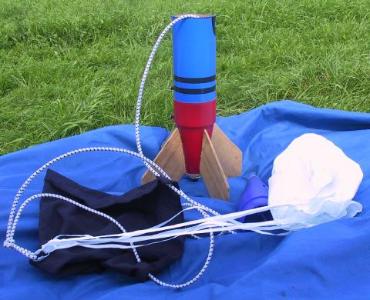
Flight:
This rocket weighs in at nearly two pounds. An F42 with a short delay was
chosen as a first, slow and low flight. The single use Aerotech F42-4T needed a
masking tape thrust shoulder to keep it from sliding up into the motor mount.
Bolts and washers were threaded into the threaded inserts of the lower ring to
provide positive motor retention.
I did run into a spot of trouble the first time on the rail. The plastic boat tail shoulder is slightly larger in the diameter than the cardboard body tube. This resulted in the rail angling slightly in towards the rocket and binding against the nose cone shoulder. A field modification was done to add a washer under the upper rail button (no epoxy, no problem). The rail now rides parallel to the body tube.
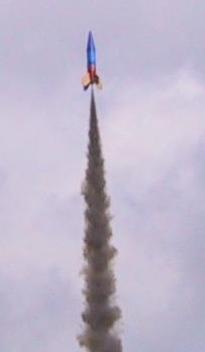 The engine lit right up, and
the C-V2 lumbered smoothly up to approximately 300 feet. A clean ejection and
recovery ended the first flight.
The engine lit right up, and
the C-V2 lumbered smoothly up to approximately 300 feet. A clean ejection and
recovery ended the first flight.
A second flight on an Aerotech single use G38-4FJ was done. The C-V2 briskly boosted to several hundred feet, ejected on cue, and took its own sweet time to unfurl the parachute. It deployed with hundreds of feet left to go, and was recovered safely.
Summary:
This is a great performing mid-power rocket. The TTW, foamed boat tail seems
quite strong. My choice of fin material makes it heavier than it would be with
a nice set of G10 fins.
It was an extremely economical rocket to build, considering I had an extra crayon tip from a previous rocket. The $6 blue crayon, scrap lumber, and about $20 at the hardware store put it all together.
Sponsored Ads
 |
 |











